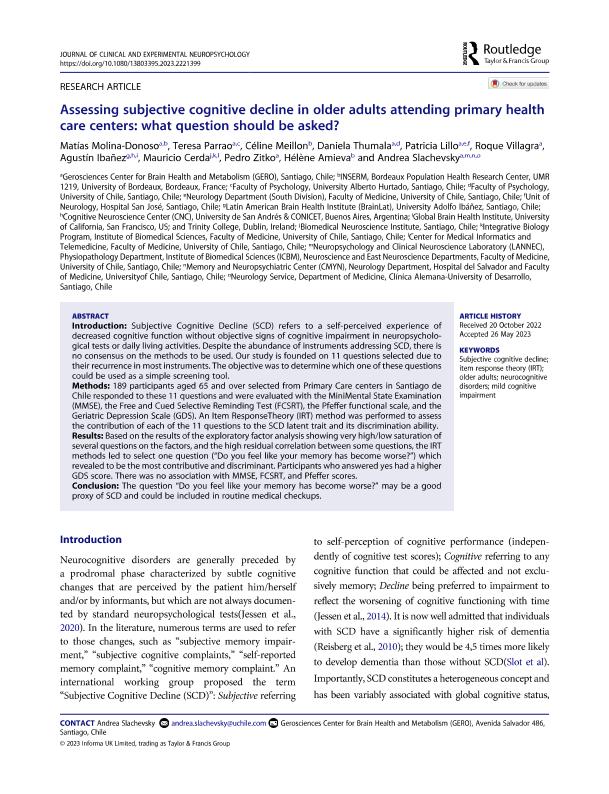Mostrar el registro sencillo del ítem
dc.contributor.author
Molina Donoso, Matías
dc.contributor.author
Parrao, Teresa
dc.contributor.author
Meillon, Céline
dc.contributor.author
Thumala, Daniela
dc.contributor.author
Lillo, Patricia
dc.contributor.author
Villagra, Roque
dc.contributor.author
Ibanez Barassi, Agustin Mariano

dc.contributor.author
Cerda, Mauricio
dc.contributor.author
Zitko, Pedro
dc.contributor.author
Amieva, Hélène
dc.contributor.author
Slachevsky, Andrea
dc.date.available
2023-12-13T14:25:13Z
dc.date.issued
2023-07
dc.identifier.citation
Molina Donoso, Matías; Parrao, Teresa; Meillon, Céline; Thumala, Daniela; Lillo, Patricia; et al.; Assessing subjective cognitive decline in older adults attending primary health care centers: what question should be asked?; Taylor & Francis; Journal of Clinical and Experimental Neuropsychology; 45; 3; 7-2023; 313-320
dc.identifier.issn
1380-3395
dc.identifier.uri
http://hdl.handle.net/11336/220129
dc.description.abstract
Introduction: Subjective Cognitive Decline (SCD) refers to a self-perceived experience of decreased cognitive function without objective signs of cognitive impairment in neuropsychological tests or daily living activities. Despite the abundance of instruments addressing SCD, there is no consensus on the methods to be used. Our study is founded on 11 questions selected due to their recurrence in most instruments. The objective was to determine which one of these questions could be used as a simple screening tool. Methods: 189 participants aged 65 and over selected from Primary Care centers in Santiago de Chile responded to these 11 questions and were evaluated with the MiniMental State Examination (MMSE), the Free and Cued Selective Reminding Test (FCSRT), the Pfeffer functional scale, and the Geriatric Depression Scale (GDS). An Item ResponseTheory (IRT) method was performed to assess the contribution of each of the 11 questions to the SCD latent trait and its discrimination ability. Results: Based on the results of the exploratory factor analysis showing very high/low saturation of several questions on the factors, and the high residual correlation between some questions, the IRT methods led to select one question (“Do you feel like your memory has become worse?”) which revealed to be the most contributive and discriminant. Participants who answered yes had a higher GDS score. There was no association with MMSE, FCSRT, and Pfeffer scores. Conclusion: The question “Do you feel like your memory has become worse?” may be a good proxy of SCD and could be included in routine medical checkups.
dc.format
application/pdf
dc.language.iso
eng
dc.publisher
Taylor & Francis

dc.rights
info:eu-repo/semantics/openAccess
dc.rights.uri
https://creativecommons.org/licenses/by-nc-sa/2.5/ar/
dc.subject
ITEM RESPONSE THEORY (IRT)
dc.subject
MILD COGNITIVE IMPAIRMENT
dc.subject
NEUROCOGNITIVE DISORDERS
dc.subject
OLDER ADULTS
dc.subject
SUBJECTIVE COGNITIVE DECLINE
dc.subject.classification
Neurociencias

dc.subject.classification
Medicina Básica

dc.subject.classification
CIENCIAS MÉDICAS Y DE LA SALUD

dc.title
Assessing subjective cognitive decline in older adults attending primary health care centers: what question should be asked?
dc.type
info:eu-repo/semantics/article
dc.type
info:ar-repo/semantics/artículo
dc.type
info:eu-repo/semantics/publishedVersion
dc.date.updated
2023-12-12T13:09:05Z
dc.journal.volume
45
dc.journal.number
3
dc.journal.pagination
313-320
dc.journal.pais
Estados Unidos

dc.description.fil
Fil: Molina Donoso, Matías. Gerosciences Center for Brain Health and Metabolism; Chile. University of Bordeaux; Francia. Inserm; Francia
dc.description.fil
Fil: Parrao, Teresa. Gerosciences Center for Brain Health and Metabolism; Chile. Universidad Alberto Hurtado; Chile
dc.description.fil
Fil: Meillon, Céline. Inserm; Francia. University of Bordeaux; Francia
dc.description.fil
Fil: Thumala, Daniela. Gerosciences Center for Brain Health and Metabolism; Chile
dc.description.fil
Fil: Lillo, Patricia. Universidad de Chile; Chile. Gerosciences Center for Brain Health and Metabolism; Chile
dc.description.fil
Fil: Villagra, Roque. Gerosciences Center for Brain Health and Metabolism; Chile
dc.description.fil
Fil: Ibanez Barassi, Agustin Mariano. Universidad Autonoma del Caribe; Colombia. Universidad de San Andrés; Argentina. Consejo Nacional de Investigaciones Científicas y Técnicas; Argentina. University of California; Estados Unidos
dc.description.fil
Fil: Cerda, Mauricio. Gerosciences Center for Brain Health and Metabolism; Chile
dc.description.fil
Fil: Zitko, Pedro. Gerosciences Center for Brain Health and Metabolism; Chile. Universidad Adolfo Ibanez; Chile
dc.description.fil
Fil: Amieva, Hélène. Inserm; Francia. University of Bordeaux; Francia
dc.description.fil
Fil: Slachevsky, Andrea. Universidad de Chile; Chile. Gerosciences Center for Brain Health and Metabolism; Chile
dc.journal.title
Journal of Clinical and Experimental Neuropsychology

dc.relation.alternativeid
info:eu-repo/semantics/altIdentifier/url/https://www.tandfonline.com/doi/full/10.1080/13803395.2023.2221399
dc.relation.alternativeid
info:eu-repo/semantics/altIdentifier/doi/http://dx.doi.org/10.1080/13803395.2023.2221399
Archivos asociados
